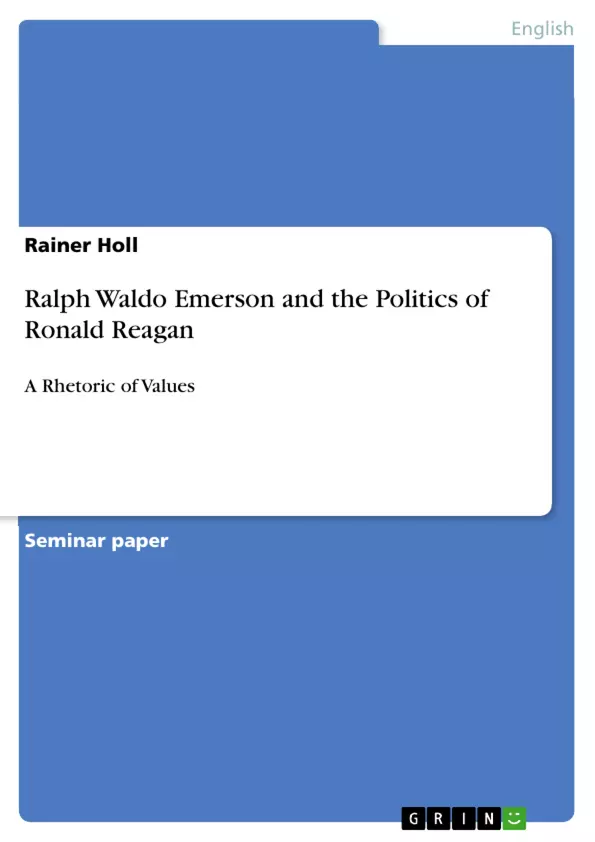The importance of the Romantic period and the meaning of its ideas for the development of the United States can not be overestimated. Ralph Waldo Emerson as its ingenious prototype for the American Scholar formulated ideas that created a base for a transcending Civil Religion that seems to be the foundation of the American self-concept.
This Civil Religion was also the base for the politics of one of the most conservative politicians of the 20th century, Ronald Reagan. In my work I want to show that Emerson's ideas and the politics of Ronald Reagan don't exclude each other. Both, Emerson and Reagan, can be regarded as excellent speakers and writers, well versed in their rhetoric means. I want to show that there is a common ground where the ideas and the rhetoric of these seemingly contradictory characters meet, which supports the idea of an overaching truth within the minds of the American people.
Table of Contents
- Introduction
- Emerson and Democracy
- Emerson and Politics
- Words that have Wings
- The Great Communicator
- Conclusion
Objectives and Key Themes
This essay aims to explore the relationship between Ralph Waldo Emerson's philosophical ideas and the politics of Ronald Reagan, specifically focusing on Emerson's concept of democracy and the use of rhetoric in American politics. It explores the potential parallels between Emerson's philosophy and Reagan's political agenda, examining how Emerson's ideas may have resonated with Reagan's approach to leadership and communication.
- Emerson's conception of democracy and its relationship to American politics.
- The role of rhetoric in presidential leadership and the influence of Emersonian ideas on political communication.
- The connection between Emerson's philosophy of the self and Reagan's political agenda.
- The lasting impact of Emerson's ideas on American political discourse.
- The complex relationship between Emerson's liberalism and Reagan's conservatism.
Chapter Summaries
The essay begins with an introduction that discusses the importance of Romanticism in shaping American identity and introduces Ralph Waldo Emerson as a pivotal figure in the Transcendentalist movement. It also acknowledges the ongoing debate surrounding Emerson's intellectual legacy and the challenges of interpreting his complex and sometimes contradictory writings.
The chapter “Emerson and Democracy” delves into the evolution of Emerson's understanding of democracy. It examines the concept of Civil Religion in America and its core principles, comparing them to Emerson's ideas about the importance of individual responsibility and self-reliance. This chapter also explores Emerson's initial skepticism towards democracy and his eventual embrace of its potential for fostering intellectual independence.
The chapter titled “Emerson and Politics” explores Emerson's critical thoughts about democracy and his concept of politics. It examines his essays dealing with power and wealth, and discusses his views on the role of the individual in society.
Keywords
This essay focuses on the intersection of American political thought, Romanticism, Transcendentalism, Emerson's philosophy, presidential rhetoric, and the legacy of Ronald Reagan. The key terms include democracy, self-reliance, individualism, Civil Religion, rhetoric, political communication, and the relationship between liberalism and conservatism.
Frequently Asked Questions
How are Ralph Waldo Emerson and Ronald Reagan connected?
The essay argues that Emerson's ideas on self-reliance and Civil Religion provided a base for the conservative rhetoric and political self-concept of Ronald Reagan.
What is Emerson's concept of "Self-Reliance"?
It is the philosophical idea that individuals should trust their own intuition and judgment over societal conformity, a theme often echoed in Reagan's individualistic policies.
What is the "Civil Religion" mentioned in the essay?
It refers to the transcending set of beliefs and values that form the foundation of the American self-concept, which both Emerson and Reagan utilized in their rhetoric.
Why is Ronald Reagan called the "Great Communicator"?
Reagan was known for his exceptional rhetorical skills, which the essay links to the transcendentalist tradition of using powerful, "winged" words to inspire the public.
Can Emerson's liberalism coexist with Reagan's conservatism?
The work suggests they are not mutually exclusive, as both meet on a common ground of American identity, individual responsibility, and democratic ideals.
- Arbeit zitieren
- Rainer Holl (Autor:in), 2008, Ralph Waldo Emerson and the Politics of Ronald Reagan , München, GRIN Verlag, https://www.grin.com/document/135052



